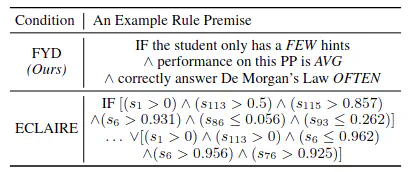Human-Readable Neuro-Fuzzy Networks from Frequent Yet Discernible Patterns in Reward-Based Environments

Abstract
We propose self-organizing and simplifying neuro-fuzzy networks (NFNs) to yield transparent human-readable policies by exploiting fuzzy information granulation and graph theory. Deriving from social network analysis, we retain only the frequent-yet-discernible (FYD) patterns in NFNs and apply them to reward-based scenarios. The effectiveness of NFNs from FYD patterns is shown in classic control and a real-world classroom using an intelligent tutoring system to teach students.
Type
Publication
In The 34th International Joint Conference on Artificial Intelligence